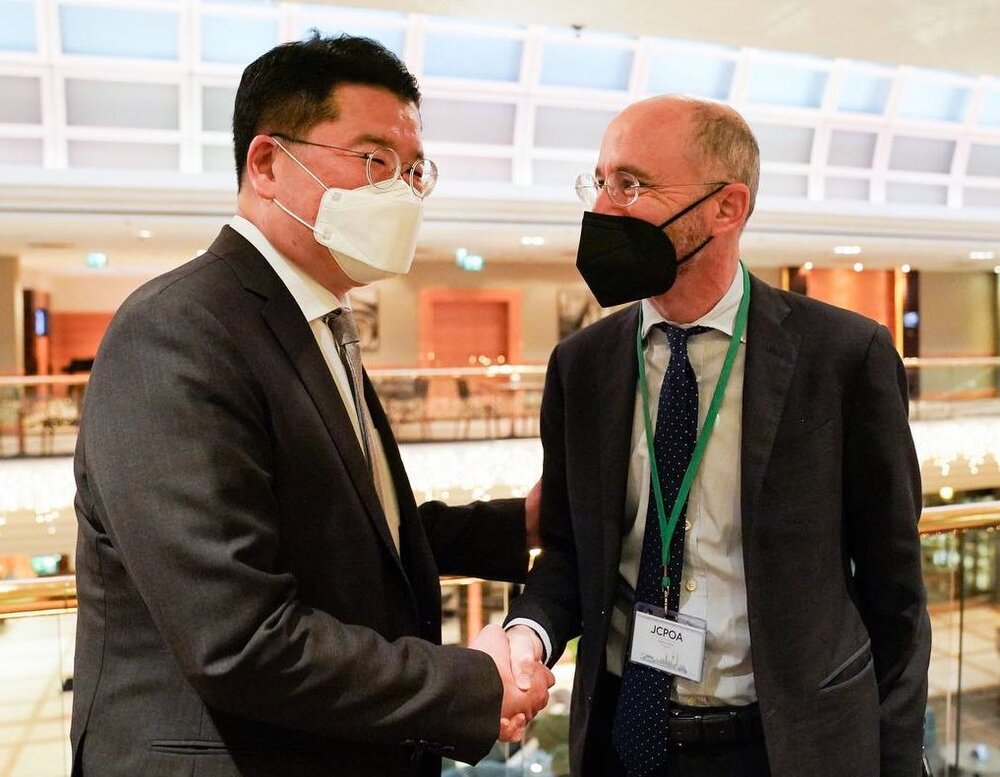Diplomatic efforts continue in Vienna

TEHRAN — As the Vienna talks have reached a sensitive stage, talks between the diplomats are going on.
The American top negotiator met with the Arab countries’ ambassadors in Vienna on Friday.
“Good conversation today with representatives from the GCC, Egypt, and Jordan about our ongoing negotiations for a mutual return to compliance with the JCPOA. As negotiations reach a conclusion in the coming weeks, we will continue to consult closely with our regional partners,” Robert Malley tweeted on Friday.
Meanwhile, Jong Kun Choi, South Korea’s Vice Minister for Foreign Affairs met with Malley on Friday.
“Spoke with @USEnvoyIran about where the negotiation to revive #JCPOA is headed & discussed ways to smoothen things. @mofa_kr supports diplomatic efforts by @Bagheri_Kani, @enriquemora, @Amb_Ulyanov, & #E3 in #Vienna from #Seoul!” Choi tweeted on Friday.
The heads of delegations of Iran and the P4+1 countries are planning to return to Vienna soon. Before returning to the Austrian capital, Iran’s chief negotiator Ali Bagheri Kani briefed the members of the Iranian Parliament’s National Security and Foreign Policy Committee on the latest developments in the Vienna talks.
After the briefing, Mahmoud Abbaszadeh Meshkini, the spokesman for the Committee, said time is ripe for reaching a good and win-win deal on the condition that the West shows seriousness and goodwill.
Speaking to the Islamic Consultative Assembly News Agency (ICANA), the spokesman gave some details about the Tuesday meeting that the Committee members held with Baqeri Kani.
During the session, the spokesman said, a report on the Vienna negotiations was presented and questions by the lawmakers were answered.
According to Meshkini, Bagheri Kani assessed the negotiations process positively and said that the Islamic Republic of Iran is participating in the talks with goodwill and seriousness.
Bagheri also pointed out that Iran and the U.S. have not held any direct talks so far, according to the MP.
Meshkini said that the Committee concluded from the session that basically the results of direct negotiations with the U.S. are not clear.
“Although there are signs of progress in the Vienna talks, still there are outstanding issues that need to be negotiated and dealt with,” he said.
Iran is entitled to enjoy full sanctions removal but the other side has so far accepted partial removal of sanctions, the lawmaker added.
Meshkini noted there are indications that the current conditions for a good and win-win deal have been provided on the condition that the West shows seriousness and goodwill.
The remarks came days before the return of Bagheri Kani and other delegations’ heads to Vienna, meaning that Iran is making clear that making further progress in Vienna or conclusion of the talks rest on seriousness and flexibility on the part of the U.S.
The heads of the negotiating teams in Vienna had returned home a few days ago for consultations. However, the talks are moving ahead at expert level, a further indication that the return of chief negotiators was meant to conduct political consultations in capitals.
European Union coordinator Enrique Mora has confirmed that. “The 8th round of the #ViennaTalks #JCPOA, which started 27 December, so far the longest, takes a break.
Participants will go back to capital for consultations and instructions to come back next week. Political decisions are needed now. Safe travels to all participants,” Mora tweeted on Friday.
The short hiatus came amid assessments that the talks have reached their final stage. Russian ambassador to international organizations in Vienna Mikhail Ulyanov has pointed to such assessments.
“The participants in the #ViennaTalks on #JCPOA will take a break, not very long, for consultations in the capitals. The negotiations have reached advanced stage when political decisions are needed. The 8th round is expected to resume next week,” Ulyanov tweeted on January 29.
The conclusion that the talks are in the final stage is also shared by the Americans, with the difference that the Americans use the final-stage assessment to force Iran to make concessions.
A senior U.S. State Department official has resorted to such a tactic. In a special briefing on Monday, the U.S. official claimed that the talks are in the final stretch and that Iran needed to make a decision.
Leave a Comment